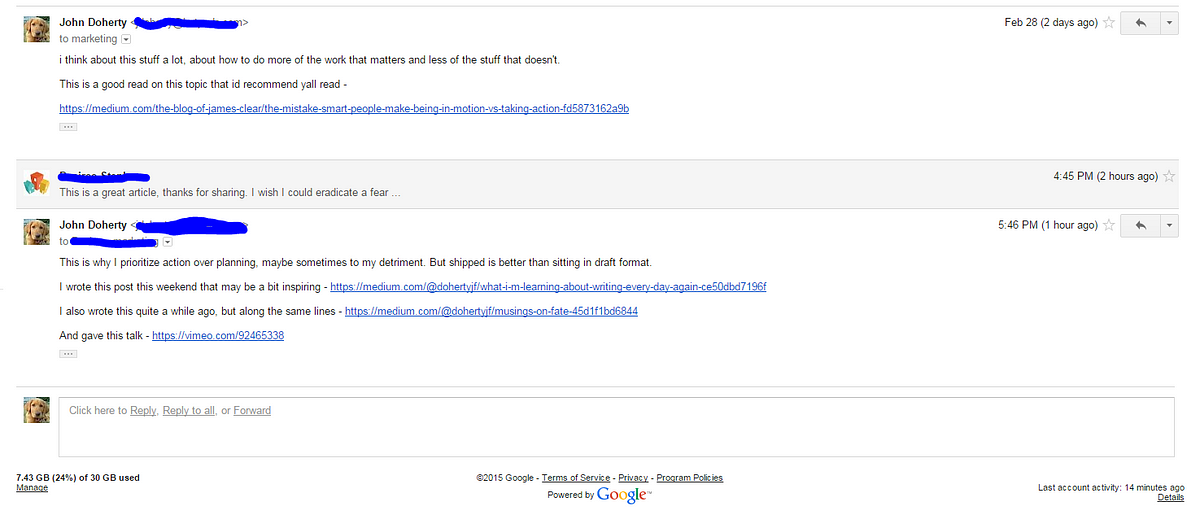When I became a boss I never really thought about the fact that the way I’m put together and tend to be day-to-day could end up being a liability for me in some ways. I mean, the same is true of marriage (I’ve been married just over a year), but in a professional sense it feels different.
I have always considered myself a 10x professional. I get a lot done and pride myself on that. I can have 8–10 things in my head and on my mind at once, and I can pretty well hold all of them in tension and somehow get them all done. I don’t say this to brag; it’s simply a reality of who I am.
At Zillow we all go through the Insights training. Mine said that I “take on too much but somehow get it all done on time.” This nailed it.
Because of this, I tend to expect a lot from those who work for me. If someone doesn’t step up to get things done fast enough for me, I’ll do them instead just so that work gets shipped. I have very little patience for procrastination or overthinking as I closely ascribe in a lot of ways to Facebook’s “shipped is better than done.” In fact, Zillow has a core value of “Move Fast. Think big.” We believe in rapid action and trying many things to get to the right answer.
The problem with my approach and way of being is when someone or a certain role calls for being a bit more deliberate. I personally have very little patience for a 45 minute meeting that has no resolution. That’s a wasted 45 minutes for me. However, sometimes things call for being discussed for 45 minutes to get to the right solution.
So what does one do as a 10x boss who recognizes that they could be overdemanding?
I’ve developed a few strategies.
Abstain From Meetings
One of the hardest parts about being a manager is learning when you don’t need to be in a meeting. Meetings on your team can happen without you being present in the room once the people, or the person leading the meeting, has earned your trust.
Abstaining from meetings where I will get frustrated has been one of the most freeing things I’ve done in the last year. If I cannot avoid being in the meeting, I will give feedback to the person about how we can make the meeting work smoother. Either way, I’m biasing towards action instead of sitting in frustration frequently.
Hire People Smarter Than You
This one is simple. If you hire people who are smarter than you and work harder than you, then you won’t have to motivate them to move faster. A good hire for me is one who comes in, takes ownership of the situations I hired them to take care of, and gets things done so fast that I go “Wow.”
Smart people do this.
Bias The Team Towards Action
As I said at the beginning of this article, I bias towards action. I very much take Facebook’s old perspective of Move Fast and Break Things. I have become very comfortable with biasing towards action and shipping something that is not quite perfect because I know that I will learn something valuable and can then make it better. Maybe it’s because I’m an optimizer at heart, but I prefer to see opportunity than try to finesse something that I am not even sure will resonate.
I sent this email to my team today. I share it with you here in the spirit of openness:

Good read — The Mistake Smart People Make: Being In Motion vs Taking Action
Just F*cking Go from Ignite Oakland
Are you a highly productive person? What strategies have you found to motivate others to action while also allowing them to work at their pace?

Hey John
Nice post man! I don’t think we’d work very well together! Or, you would help me become a more efficient worker. 🙂 You said:
I have very little patience for procrastination or overthinking.
Being a creative/ideation junky those are pretty much two of my biggest weaknesses – and unfortunately how I tend to operate. I WAY overthink to the point where I’ve been late with work. It’s not that I’m not working on it, I’ve spent 5 extra hours trying to get it perfect.
But, recently I’ve learned to overcome this too by at least being aware of the weaknesses, and realizing that 99.9% of the time clients are really happy with my work. Instead I focus on trying to keep the communication going rather than let things go on for days/weeks/months.
Thanks, John. When I became the boss of my growth-hacking team, I struggled to share my knowledge and deep hankering for getting sh*t done. How could I expect them to get everything done right at the right time in the right order like I always did?
The tip on meetings is great. Why meet when I can usually just tell them the best way to do something in less than 5 minutes? I love the thought of hiring smarter people. In theory. But c’mon, are there really people smarter than you and I? 😉
I wish I could see more team emails like that. I’ll check out the video when I’m done working — if I ever am.
I hear ya, Joe.
I manage over 15 people right now. (It’s like hearing dumb cats, amirite?) Sometimes I don’t even get the time to follow through with my 100’s of awesome ideas per day because I’m so busy dealing with these people. You have to hire well in the first place, ya know? Only us bosses will understand the hardships in this boss life.
Anyway, I think people need to remember to start small but (and here’s the trick) think BIG!
I really can’t stand it when it’s the other way around.
Keep writing these great posts, John. I connect with so many of them.
TC
Baltimore, MD
Hello John!
Thanks for this awesome post. I think I also have the tendency to demand too much from people working with/for me because I have an eye for excellence. My favourite of the tips you shared is hiring smarter people. That just makes a lot of sense.
Hello John! Awesome post.
I have to say I don’t think we would get on well working together. I’m self motivated and so I don’t like being ‘policed’ or pressured to deliver. I can often do so instinctively.
I like your suggestion of hiring smarter people.
I observed that after working for more than 3 years in the same organization, most of the employees get demotivated and they just do their routine work without doing any creative work. How can they motivate themselves?
I think incentives might work. If the employees are surprised regularly with gifts, promotions and vacation benefits by the company, their motivation to give their best might soar once again. I hope that helps.